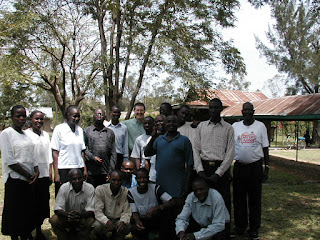"Why not just send money?" I get this question a lot. I
ask this question a lot - especially while I'm there. Usually on the third or fourth day of the trip, still adjusting from jetlag ...
why didn't I just send money?!?!
This is my sixth trip to Kenya. Each trip has a high cost: a few thousand dollars, back-to-back 9-hour flights each way, social unrest in country, somewhat uncomfortable living conditions, heat, bathrooms that require great care and balance, vigilance to keep hydrated with filtered water, and for me, trouble sleeping and other physical challenges. No air conditioning, no ice, language barriers, and at least once during the trip, chicken droppings somewhere in the bedroom. Of course, there are the weeks apart from Lynne and limited communications. It consumes not only the two weeks there, but several weeks of preparation and at least a week afterwards to recover and sort through the tasks that have piled up.
Are all the various costs worth it? Wouldn't it be more cost effective to just send money for needs that they have? My best answer is:
the costs are very likely worth it. But I can't completely quantify it.
There are both
objective and
subjective reasons why I continue to believe so.
Objectively, there are some resources that we have been blessed with that we can turn around and share with those in Kenya, such as seminary-level education. That's something they have scarce little of, and it's too a great privilege to not share with others. I don't have to be an exceptional seminary-level teacher in order to share that blessing.
Furthermore, some of their leaders need encouragement or a break. Having a guest teacher allows them some down time, a chance to receive instead of give, a chance to catch up on student records or grading, and so on.
Considering that a seminary
multiplies the good that the church can bring to a society, these are investments that pay good dividends. I taught my students Leviticus in 2006, and
still graduates can explain how it benefits their current ministries.
One of our projects this year is to train and equip one of the villages to use water filtration systems. The good folks there have all the will, smarts, ability to run this program, but someone has to acquire, deliver, and initially train them for these systems. We've got to send someone over to do this - just sending the kits and some written instructions will not create a successful implementation. But once we deliver and train, then we can eventually pull back and simply provide the kits. They can take it from there. How much money is a million gallons of clean water worth? How about 30 million gallons? That's the capacity we're bringing over in
just this first delivery. Worth every penny.
Just sending money cannot meet needs like these. We do need to send money to resource the Kenyans for things they are far more qualified to do than we are, such as classroom teaching of the orphans, construction in the Kenyan way, and training school teachers (our teaching methods don't always translate well).
But the Kenyans will tell you why they think it's worth it, and their reasons are far more
subjective. We simply have a hard time comprehending how valuable the
ministry of presence is. They will tell you over and over again that they'd rather have a visitor for two weeks than the money it took to get that person there. Visitors, especially those who visit several times, can do wonders to remind them that they are not forgotten, they are not alone, and they are loved. We are doing life
with them, not doing things
for them or
to them. It conveys the fundamental truth that they are valuable primarily because they are created in the image of God, no less than anyone else, regardless of life circumstance.
Yes, we do projects when we're there, but none of the projects seem to be as valuable as spending time with our friends in Kenya. Which means that task-oriented people like me need to keep reminding themselves to put the project aside and spend time with people. Talk with them, listen to them, laugh together, embrace their hurts and share your own, learn some of their words, sing their songs, and just be there in their space with them.
Sometime between the fourth day and the last few days of each trip, I am reminded again why it's all worth it. And as much as I want to be back home again, I do have to peel myself away, too. (And then that's followed by a couple of months of "I'm never going back" and then later "I can't wait to get over there again.")







